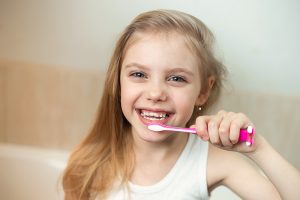Ages and Stages: 0-2 Years Old
October 20, 2015

Dental care for babies is important, even though the first teeth don’t actually break through until the 6-8 month mark for most babies. Gum care can be done simply by wiping them with a soft cloth after you feed your baby. If you didn’t know already, you can actually start brushing when the first tooth breaks through at least twice a day with a tiny bit of fluoride toothpaste and a soft brush.
We realize that swallowing a great amount of toothpaste can be very dangerous for your infant if fluoride is present, but just a tiny bit has been proven safe and is actually now recommended as the standard practice by the American Academy of Pediatric Dentistry. This amount would be equivalent to the size of a grain of rice.
Try to never put your baby to sleep with a bottle in his or her mouth or use sippy cups or bottles in the course of the day. The sugars from milk and juice (yes, even breast milk) can cause cavities and tooth decay. We can discuss this further with you when you bring your baby in for his or her first appointment.
We prefer to see your child when the first tooth breaks through, but try not to wait until after the first birthday at the very latest.
Ages and Stages: 6-11 Years Old

This stage of your child’s life is roughly where the tooth fairy comes in. Baby teeth are prone to be lost in front and back.
When the teeth begin to touch one another, it is recommended to start flossing habits. The back teeth, gumline, and the molar grooves are where children neglect most often and in these molar grooves are where the overwhelming majority of cavities develop in the permanent teeth.
You can always opt for a dental sealant to help combat this issue along with helping to strengthen your child’s good dental habits overall. For those parents with children who are into sports, mouthguards are highly recommended (required in some cases), especially for contact sports like football or baseball where contact with another child or getting hit in the mouth with the ball is a distinct possibility.
Ages and Stages: 3–5 Years Old

At about 3 years of age, your child should have all of his or her baby teeth in place. Since statistics show that close to 50% of kids have their first cavity before their first day of school, preventive measures should be taken.
We realize every child is different, but try to make sure that bottles and sippy cups are a thing of the past beyond one year of age. Fluoride toothpaste should be used (pea-size for a 2 year old, slightly bigger for ages 3-5), and sugary snacks between meals should be given sparingly.
The American Academy of Pediatric Dentistry (AAPD) says that no more than 6 ounces of juice should be given in a day. Those sucking habits like use of a soother or thumb-sucking should be stopped before age to prevent facial development issues and bite problems (buck teeth for example).
Kids this age are likely trying to be independent, wanting to brush their own teeth and all, so let them do it but keep close supervision to ensure they do it right and stay with it.
Ages and Stages: 12-18 Years Old

Generally around this time in your child’s life, all the baby teeth are gone and all the permanent ones have risen up to replace them.
While it is a sign of growing up and could be a good thing that they are taking more strides toward independence, this could spell trouble for dental habits since teenagers are more likely to drink sodas and eat unhealthy snacks.
Teens are also more self-aware or self-conscious about their appearance, so bring your teen in and talk with us if he or she has teeth that are discolored or crooked. Discussions about whitenings and braces can occur.
We will also take X-rays of the jaws to do early detection of wisdom teeth (third molars) and let you know approximately when you should take your child in to have them removed by an oral surgeon.
While this is a disturbing thought, the fact is that substance use and/or abuse mostly occurs in the teen years such as smoking cigarettes and drinking. This is unhealthy for your child in any sense, but there are specific dental problems that could develop. This is also the most likely time for eating disorders, which can lead to dental problems in addition to others. Although we are a dental office, don’t hesitate to talk to us if you are seeking help with these teen issues. We can help, and we would be honored to do so.
